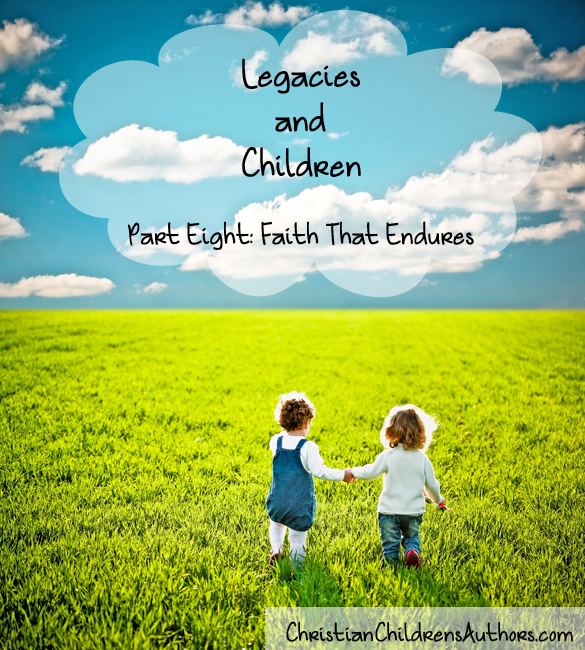Legacies and Children: Faith to Endure

The thing that I dislike the most about Christmas is that it must end. For days, weeks, even months beforehand, the sense of anticipation and joy grew. Surprises were planned and memories dusted off and removed from their boxes. Favorite movies were watched, songs were sung, and games were played. The birth of our Savior was celebrated. But now what? Now it is time to put our memories back in their boxes, and suddenly we are left with a bare and quiet house.
In the story of every family there are moments that shine bright, like Christmas tree lights and others that are covered in shadows, like dusty boxes in the attic. Every family’s legacy is shaped by how fully we live the bright moments and how we respond to the gray ones.
The story of Laura Ingalls Wilder and her family is no different. In her book On the Banks of Plum Creek, Laura shares the adventures she experienced as the family settled in Plum Creek, Minnesota. The memories that fill the first several chapters were mostly pleasant ones—all except for that Nellie Oleson she met at school. The wheat crop was bigger and richer than any her Pa had ever seen. Harvest was less than a week away.
The first sign of trouble was a strange cloud that blocked out the sunlight. Even Pa didn’t know what to make of it. That’s when the first grasshopper plunked onto Laura’s head and fell to the ground. That single grasshopper was followed by millions more, raining from the sky until they covered every square inch of the ground. It was impossible to brush them away fast enough to keep them from crawling on your clothes and clinging to your skin.
Then they began to eat. Laura’s family tried to save the wheat, but it hopeless. The plague of grasshoppers ate every green thing that grew. They ate the grass the cows needed for food and the leaves off of the plum trees. They ate the prairie grasses, the corn tassels, the potatoes, the beets, and the beans. And they ate the wheat, every single bit of it.
All Laura and her family could do was stay inside, and listen to the sound of millions of grasshoppers chewing their way through a year’s worth of work and their hope for next year. They waited, and as time passed, they began to pick up the pieces and prepare for next year. Pa began to plow the wheat field under. That’s when things got worse.
The grasshoppers had grown strong and healthy on the labors of Laura’s family and many others like hers. Now the grasshoppers were laying their eggs, covering the now-barren fields with the promise of more disaster to come the following year.
Pa decided the only thing to do was to head back East and get work before every other pioneer in the West did exactly the same thing. He walked more than two hundred miles in a pair of worn-out boots with holes in them, and the family tried to endure until he returned.
The weather grew hotter, and the milk cow began to starve. They had not heard from Pa and feared something dreadful had happened. As Ma and the girls studied the Bible one Sunday, they read Exodus 10:14-15. When Laura tried to repeat, “and there remained not any green thing in the trees, or in the herbs of the field, through all the land of Egypt,” she could not help but think the same was true “through all the land of Minnesota.”1
The oppressive heat became more than even Ma could bear that Sunday. All she wanted was a breath of cool air. In that moment, after so much heartache and suffering, a breath of cool air came. They spotted a small cloud in the sky. It wasn’t likely it would reach them with rain. But it grew and grew, coming closer and closer. Then it rained—pounding, pouring, refreshing rain!
Within a few days, green grass began to grow again, giving the hungry cows something to eat. Pa was still gone. The grasshopper eggs were still in the ground waiting to hatch another plague. But a breath of hope had blown into their home and their hearts.
I remember one Christmas night I was trying to stay awake and hold on to the moments of Christmas for as long as possible. I watched the minutes ticking by on the clock and wished I could do something to freeze time before midnight. But that night I realized that in order for the next Christmas to come, the current Christmas had to end. December 25th of next year would not come until each day between now and then had been experienced and lived.
As I move from the joy of Christmas into the humdrum of January, I have a choice. I can mope and mourn for what is past, or I can look to the God who makes everything new, and know that even now He is busy working out a future more glorious than I can imagine, one that makes even the wonder of Christmas pale in comparison.
The same is true no matter the season of life my family’s story is in. I can glory in the joyous moments that brighten our lives. And when the gray seasons come, I can wait with hope, knowing that another celebration is already on its way. So I choose to whisper good night to Christmas past, and wait with hope for the Christmas to come.
- On the Banks of Plum Creek by Laura Ingalls Wilder. A Harper Trophy Book, Harper & Row Publishers, 1971.

I love how you weave Laura’s story into so much of what you write, Bonnie.
Thank you, Cheryl. It was a fun series to write. I always wanted a remembrance book just like Laura’s!
Pingback:Legacies and Children: Faith to Endure - WriteBonnieRose.com